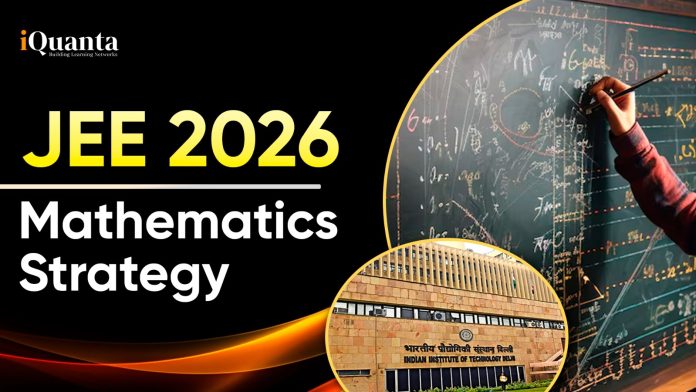JEE 2026 mathematics strategy: How to score high in maths for JEE Main and Advanced. Preparing for JEE 2026 Mathematics requires a well-planned approach focusing on key topics, concept clarity, and regular practice. With tough competition in JEE Main and JEE Advanced, mastering maths is essential for improving your overall rank.
This guide covers the best preparation tips, essential chapters, time management techniques, and recommended books for helping you ace JEE Maths 2026 effectively.
Enroll for JEE Online Coaching by iQuanta

JEE Main 2026 – A Brief Overview
| Parameter | Details |
| Mode of Examination | Online (Computer-Based Test) except Drawing section (Offline) |
| Duration | 3 hours (Paper 1), 3 hours 30 minutes (Paper 2) |
| Shifts | First Shift: 9:00 AM – 12:00 NoonSecond Shift: 3:00 PM – 6:30 PM |
| Type of Questions | – 20 MCQs per subject- 10 Numerical Value Questions per subject (attempt any 5) |
| Marking Scheme | +4 for correct answer-1 for incorrect answer (MCQs only)No penalty for unattempted questions |
JEE Main 2026 Exam Dates & Important Events (Expected)
| Event | Tentative Date (2026) |
| Release of Notification | November 2025 |
| Start of Online Registration | November – December 2025 |
| Last Date to Apply | January 2026 |
| Application Correction Window | Mid-January 2026 |
| Admit Card Release | 10–15 days before the exam |
| JEE Main 2026 Session 1 (January) | 3rd–4th week of January 2026 |
| JEE Main 2026 Session 2 (April) | 1st–2nd week of April 2026 |
| Answer Key Release | 1–2 weeks after each session |
| Result Declaration (Session 1) | February 2026 |
| Result Declaration (Session 2) | April 2026 |
| Counseling (JoSAA & CSAB) | June – July 2026 |
JEE 2026 Mathematics Strategy
| Section | Strategy |
| Syllabus Coverage | Complete NCERT + JEE syllabus. Focus on Calculus, Algebra, Coordinate Geometry, Vectors. |
| Important Topics | Prioritize Definite Integrals, 3D Geometry, Probability, Complex Numbers, Matrices. |
| Daily Study Plan | Minimum 2-3 hours for Math daily; mix concepts + problem solving. |
| Practice Questions | Solve previous 10 years’ JEE papers + chapter-wise question banks. |
| Mock Tests | Attempt 1 full mock test every week initially; increase to 2-3/week closer to exam. |
| Error Analysis | Maintain an error logbook; revisit mistakes weekly. |
| Time Management | Practice solving 60 questions within 90–100 minutes to improve speed. |
| Revision Plan | Revise formulas, short tricks, key questions every weekend. |
| Online Tools/Apps | Use graphing tools, formula apps, video lectures to strengthen visualization. |
| Doubt Clarification | Clear doubts immediately with teachers/peers/online forums; don’t leave topics pending. |
| Test-Taking Strategy | Attempt easier and familiar questions first; mark tough ones for later. |
Enroll for JEE Online Coaching by iQuanta

JEE 2026 Mathematics Strategy- iQuanta Coaching
| Focus Area | iQuanta Approach & Recommendations |
| Concept Clarity | Attend iQuanta’s live interactive classes regularly; ask doubts in real-time; revise using class recordings. |
| Practice Questions | Complete all Daily Practice Problems (DPPs) and assignments posted on the iQuanta dashboard after each class. |
| Previous Year Questions | Solve PYQs shared in iQuanta sessions & study material; prioritize JEE Advanced-level questions for higher accuracy. |
| Important Topics | Focus extra on Calculus, Algebra, Vectors, 3D Geometry, Probability, Complex Numbers, as stressed in iQuanta classes. |
| Doubt Solving | Use iQuanta’s 24×7 doubt-solving Facebook group & Telegram channels for quick resolution of queries. |
| Mock Tests | Attempt weekly full-length mock tests on the iQuanta platform; analyze detailed test reports to find weak areas. |
| Formula Revision | Use formula PDFs & one-pager notes shared by iQuanta faculty; make your own quick reference sheet. |
| Time Management | Practice iQuanta’s recommended technique: divide paper into 3 parts, solve easiest 50% first, save tricky ones for later. |
| Extra Practice | Attempt “Level Up” practice questions & “iQuanta’s handpicked tough questions” shared in bonus assignments. |
| Peer Learning | Engage in group discussions & challenge problems in iQuanta’s online community to boost competitive spirit. |
| Doubt Marathon & Crash Course | Join iQuanta’s last 30/60-day Doubt Marathon & Crash Revision sessions to cover difficult concepts fast. |
JEE 2026 Mathematics Strategy- Priority Topics
| S. No. | Topic | Sub-Topics | Why Important? |
| 1 | Calculus (Highest Priority) | Differential Calculus:- Limits, Continuity, Differentiability- Application of Derivatives (tangents, normals, maxima/minima, increasing/decreasing functions)Integral Calculus:- Indefinite & Definite Integration- Area under Curves | Major weightage in both JEE Main & Advanced; frequent application-based questions. |
| 2 | Coordinate Geometry | – Straight Lines, Circles, Parabola, Ellipse, Hyperbola- Equation of lines- Tangents & Normals- Family of curves- Locus problems | One of the easiest scoring areas with formula-based problems. |
| 3 | Algebra | – Complex Numbers (properties, argand plane, loci)- Matrices & Determinants (inverse, rank, solving linear equations)- Quadratic Equations (roots, nature of roots, graphing)- Sequences & Series (AP, GP, HP, sum formulas, AM-GM inequality)- Binomial Theorem (general term, middle term) | Fundamental for solving higher-level algebraic problems. |
| 4 | Vectors & 3D Geometry | Vectors:- Dot product, cross product- Angle between vectors3D Geometry:- Equation of planes & lines- Distance between point, line, plane | Frequently asked in JEE Advanced; simple once basics are strong. |
| 5 | Probability & Statistics | – Basic Probability rules, Conditional Probability, Bayes theorem- Mean, Median, Mode, Standard Deviation, Variance | Appears every year with straightforward questions. |
| 6 | Trigonometry | – Trigonometric Ratios & Identities- Properties of Triangles- Inverse Trigonometric Functions- Trigonometric Equations | Often used inside other chapters like calculus, coordinate geometry. |
| 7 | Mathematical Reasoning & Logic | – Statements- Truth Tables- Logical Equivalence- Contradictions | Usually 1–2 direct questions in JEE Main; free marks if practiced. |
Enroll for JEE Online Coaching by iQuanta

JEE 2026 Mathematics Strategy- Topic Prioritization
| Priority | Topics | Suggested Weightage |
| High | Calculus, Algebra, Coordinate Geometry | 40–50% |
| Medium | Vectors, 3D, Probability, Trigonometry | 25–30% |
| Low | Sets, Relations, Mathematical Reasoning | 10–15% |
JEE 2026 Mathematics Strategy- Common Mistakes to Avoid
Preparing for JEE 2026 Mathematics section requires strategic planning, consistency and a focused approach. This guide outlines the important steps and techniques to ace the mathematics section of JEE 2026:
- Understand the JEE Mathematics syllabus
The first step in your preparation journey is to thoroughly understand the syllabus and focus on core subjects like calculus, coordinate geometry, algebra, vectors, etc. Make sure to thoroughly read the syllabus released by JEE authorities and categorize topics as easy, moderate, or difficult.
- Time Management Strategy
Time management is crucial during both preparation and the actual exam. It includes making a daily study schedule, weekly plan, mock tests, etc.
- Effective study resources
Use trusted study materials and online resources to improve your understanding of JEE Mathematics. Platforms like iQuanta provide structured courses, daily practice problems, and doubt-solving sessions to clarify your concepts.
- Use online mock tests and previous year papers
Begin taking mock tests once a week after completion of each chapter to track your progress. Solve the last 5-10 years of JEE papers to understand question trends.
- Concept Building through Problem solving
Merely reading through theory isn’t enough for JEE preparation. The best way to master mathematics is through problem solving.
Click Here to Enroll to JEE 2026 Course!

Frequently Asked Questions
To prepare for JEE 2026, focus on mastering core subjects like Mathematics, Physics, and Chemistry. Develop a solid understanding of concepts, practice regularly with mock tests, and revise frequently. Create a balanced study plan, stay consistent, and focus on time management. Consider enrolling in coaching for guidance.
JEE 2026 is widely regarded as a challenging exam, particularly the Advanced phase. The difficulty level may vary depending on the IIT organizing the Advanced exam, but it is generally known for its complexity and demands rigorous preparation from candidates.
The eligibility criteria for JEE Advanced do not mandate the 75% requirement to sit for the exam. However, to gain admission to IITs, candidates must secure at least 75% (or 65% for reserved categories) in their class 12 board exams.




